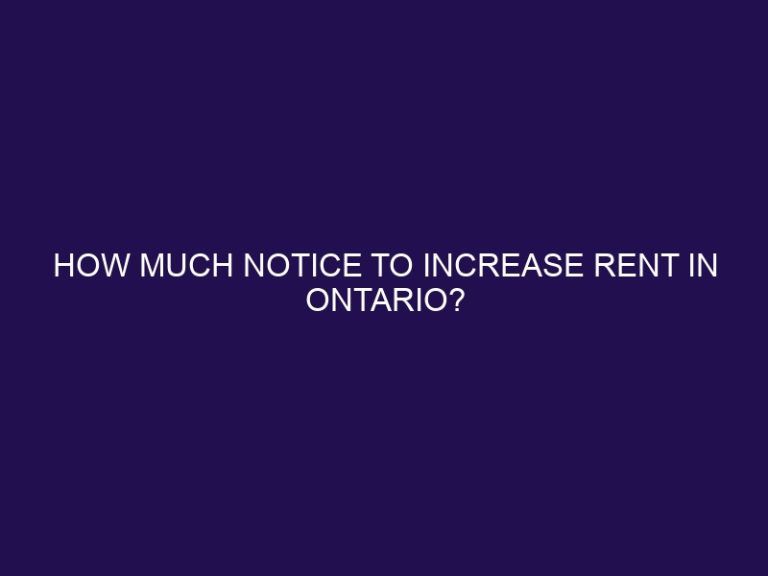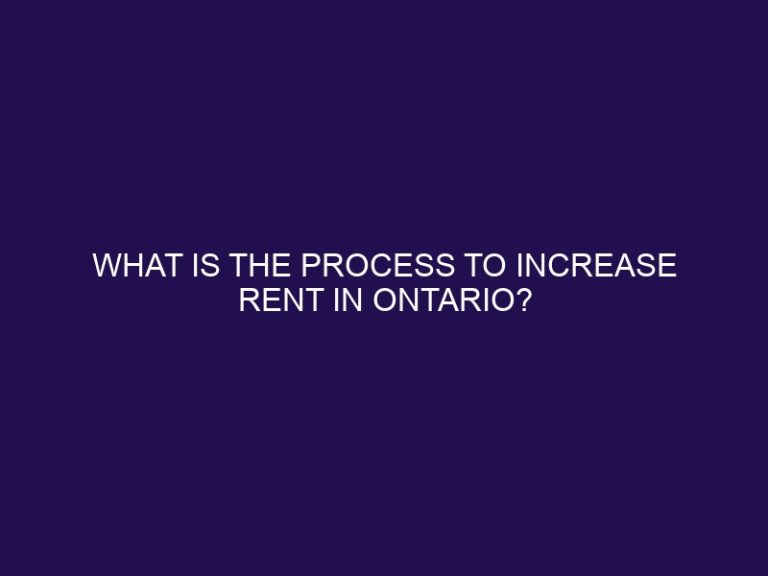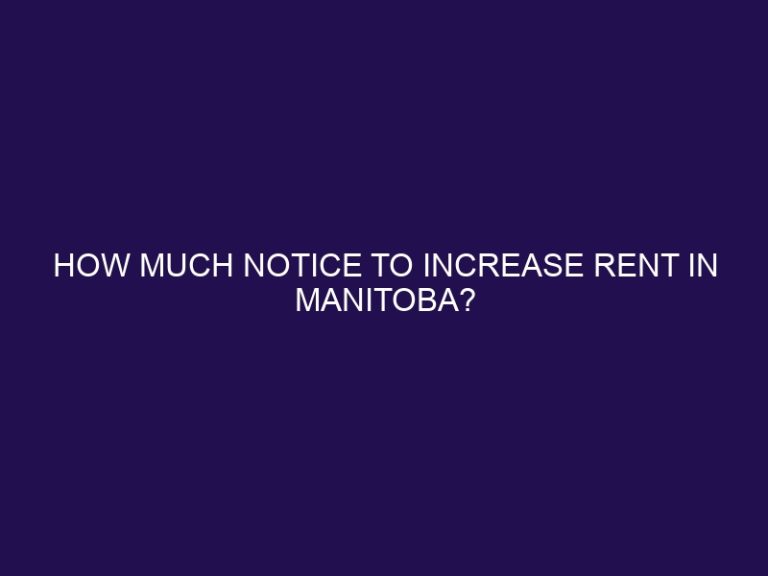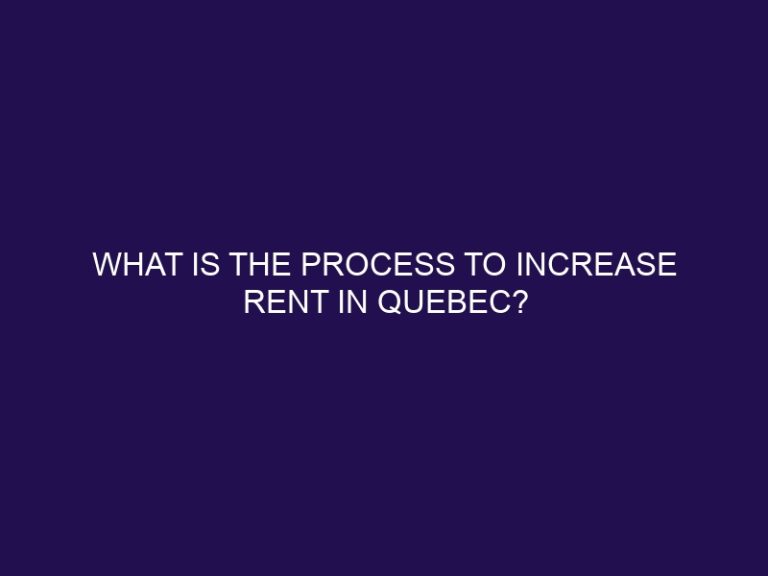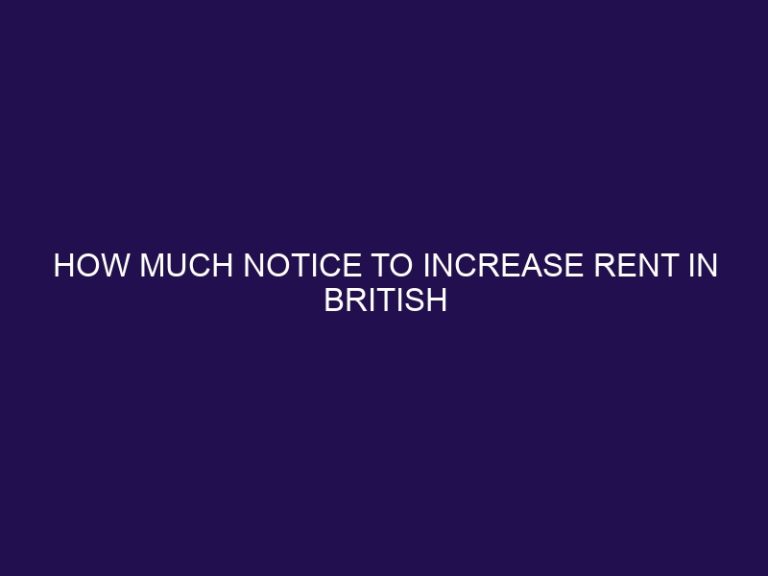What is the process to increase rent in PEI?
.jpg)
Understanding the process of increasing rent in Prince Edward Island (PEI) is essential for both landlords and tenants. PEI has specific laws and regulations in place to protect the rights and interests of both parties involved. Familiarizing yourself with these laws can help ensure a fair and legal rent increase process.
Is There a Limit on How Much Rent Can Be Increased?
In PEI, there is a limit on how much landlords can increase rent. The Rent Increase Guideline sets the maximum allowable percentage by which rent can be increased in a given year. This guideline is established by the Island Regulatory and Appeals Commission (IRAC) and is usually based on the Consumer Price Index.
What Are the Legal Requirements for Rent Increase in PEI?
To increase rent in PEI, landlords must follow certain legal requirements. These requirements include providing written notice to the tenant, following the appropriate notice period, and justifying the reasons for the rent increase.
Steps to Increase Rent in PEI
The process of increasing rent in PEI typically involves three key steps:
Step 1: Provide Written Notice
Landlords must provide written notice to the tenant regarding the rent increase. The notice should clearly state the new rent amount, the effective date of the increase, and the reasons for the increase, if required.
Step 2: Follow the Notice Period
PEI has specific notice periods that landlords must adhere to when increasing rent. The notice period will depend on the length of the tenancy and whether the rental unit is covered under the Residential Tenancies Act.
Step 3: Justify the Rent Increase
In some cases, landlords may need to provide justification for the rent increase. This may include factors such as rising property taxes, increased maintenance costs, or renovations done to the rental unit.
Exceptions and Exemptions
While there are laws governing rent increases in PEI, there are certain exceptions and exemptions to be aware of.
Are There Any Exceptions to Rent Increase Laws in PEI?
Certain rental units may be exempt from the rent increase guidelines, including units in subsidized housing, non-profit housing, or special care facilities.
What Are the Exemptions for Rent Increase in PEI?
There are also exemptions for specific circumstances, such as the landlord needing to repay a mortgage or make significant repairs that directly benefit the tenant.
Resolving Disputes and Seeking Assistance
If tenants disagree with a rent increase or have concerns about the process, there are steps they can take to resolve disputes and seek assistance.
What Should Tenants Do if They Disagree with a Rent Increase?
Tenants who disagree with a rent increase can attempt to negotiate with the landlord or seek mediation to resolve the dispute.
Where Can Tenants Seek Assistance or File a Complaint?
Tenants can seek assistance and file a complaint with the Residential Tenancies Office in PEI. The office can provide guidance and help resolve any issues related to rent increases.
By understanding the rent increase laws, following the proper steps, and seeking assistance when needed, both landlords and tenants can navigate the process of increasing rent in PEI in a fair and legally compliant manner.
Key takeaways:
- A landlord in PEI must follow specific steps to increase rent. This includes providing written notice, following the notice period, and justifying the increase.
- The laws in PEI place limits on how much rent can be increased, and there are legal requirements that must be followed to increase rent.
- If a tenant disagrees with a rent increase, they can seek assistance or file a complaint. There are resources available to help resolve disputes between landlords and tenants in PEI.
Understanding Rent Increase Laws in PEI
Understanding the rent increase laws in PEI is essential for both landlords and tenants residing in the area. In PEI, landlords are only permitted to raise the rent once within a span of 12 months. To comply with the regulations, they must provide a written notice at least three months prior to the rent increase. The maximum allowable adjustment in rent is determined by the Rent Review Office and is based on the fluctuations in the Consumer Price Index. Nonetheless, certain exceptions to these regulations exist, particularly in cases involving significant renovations or improvements carried out on the rental unit. To ensure a fair and seamless rental experience, it is imperative that both parties possess a comprehensive understanding of their rights and responsibilities.
Is There a Limit on How Much Rent Can Be Increased?
In Prince Edward Island (PEI), is there a limit on how much rent can be increased? Yes, there is. According to the Rent Increase Guidelines, landlords can only increase the rent once per year, and the maximum allowable increase is capped at the Consumer Price Index (CPI) percentage. There are exceptions for rental units built after 2005, which may have different rules. It is important for both landlords and tenants to know and understand these regulations to ensure compliance and avoid disputes. Fact: The CPI for the year 2023 in PEI is projected to be 1.5%, indicating the potential maximum rent increase for that year.
What Are the Legal Requirements for Rent Increase in PEI?
To increase rent in PEI, landlords must adhere to certain legal requirements. In Prince Edward Island, the legal requirements for rent increase dictate that landlords must provide written notice to tenants in advance, stating the proposed increase and the effective date. The notice period varies based on the tenancy agreement, typically 3 to 6 months for yearly leases. In order to justify the rent increase, landlords must demonstrate that it aligns with the market value of similar properties in PEI. It is crucial for tenants to be aware of their rights regarding rent increases and to seek assistance if they disagree with the proposed raise. If there are any disputes, the Office of the Director of Residential Rental Property is available to address these issues and provide guidance to both tenants and landlords in PEI.
Fun fact: Did you know that Prince Edward Island, also known as the “Garden of the Gulf,” is famous for its breathtaking coastline?
Steps to Increase Rent in PEI
Looking to increase rent in PEI? Look no further! Discover the essential steps that will guide you through the process effortlessly. From providing written notice to justifying the rent increase, each sub-section will unravel crucial details to ensure a smooth and legal transition. So, buckle up and get ready to navigate the ins and outs of rent increments in PEI. It’s time to take charge and maximize your property’s potential!
Step 1: Provide Written Notice
To increase rent in PEI, the initial step is to provide written notice to the tenant. Here is a list of steps to follow when providing written notice:
-
Ensure the notice is in writing and clearly states the intention to increase the rent.
-
Include the effective date of the rent increase.
-
Mention the new rent amount and any specific terms or conditions associated with the increase.
-
Deliver the notice to the tenant in person or by registered mail.
-
Keep a copy of the notice for your records.
It’s vital to remember that providing written notice is just the first step in the process. It is necessary to follow the required notice period and justify the rent increase as per the legal requirements. Seek legal advice or consult the PEI Residential Tenancies Office for further assistance.
Step 2: Follow the Notice Period
- Review the residential tenancy agreement to determine the length of notice required.
- Follow the notice period by preparing a written notice of rent increase, including the effective date and amount of the increase.
- Provide the notice to the tenant within the required timeframe, typically 3 months before the increase takes effect.
- Ensure the notice is served in an acceptable manner, such as delivering it personally or by registered mail.
- Keep a copy of the notice and proof of service for your records.
By following these steps, landlords in PEI can comply with the notice period requirement when increasing rent.
Step 3: Justify the Rent Increase
- Review the current market conditions and compare the rent with similar properties in the area.
- Consider any improvements or upgrades made to the rental property that enhance its value or amenities.
- Step 3: Justify the Rent Increase – Factor in the rising costs of property taxes, maintenance, insurance, and utilities.
- Document any changes in government legislation or regulations that impact rental costs.
- Be prepared to provide evidence or documentation supporting the need for a rent increase.
By following these steps and providing a clear and valid justification for the rent increase, landlords can ensure compliance with rent increase laws in PEI.
Exceptions and Exemptions
- Exceptions: There are certain situations where landlords in PEI are forbidden from increasing rent. These include when the rental unit is subsidized, when the tenant has a fixed-term lease with an agreed-upon rent, or when rent control measures are in place.
- Exemptions: Some types of rental properties are exempt from rent increase guidelines in PEI. These include units in buildings constructed after November 1, 2018, units with regulated rent, and units with an enforceable rent reduction order.
Pro-tip: It’s essential for both landlords and tenants to familiarize themselves with the exceptions and exemptions to ensure they are aware of their rights and responsibilities regarding rent increases in PEI.
Are There Any Exceptions to Rent Increase Laws in PEI?
Yes, there are exceptions to rent increase laws in PEI. Are There Any Exceptions to Rent Increase Laws in PEI? According to the Residential Rental Property Act, landlords cannot increase rent more than once in any twelve-month period, except in certain circumstances. Some exceptions to rent increase laws include when a property is substandard or requires significant repairs, or when the landlord can prove a significant increase in property taxes or operating costs. Landlords must provide evidence and justification for the increase to the Rental Board. Rent increases cannot be imposed while a property is subject to a minimum rental rate agreement or a subsidized rental agreement.
What Are the Exemptions for Rent Increase in PEI?
In PEI, it is crucial for landlords to be aware of the exemptions to the rent increase laws. These exemptions allow landlords to increase rent in certain situations without being subject to the usual restrictions. Let’s explore the common exemptions in PEI:
| 1. Rent increases for capital expenditures: | In PEI, landlords have the opportunity to raise rent to cover the cost of significant improvements made to the rental property. |
| 2. Rent increases for new construction or major renovations: | If landlords have undertaken substantial changes to the rental property, they may be eligible to adjust the rent accordingly. |
| 3. Rent increases for additional services or amenities: | Landlords can increase rent if they have introduced new services or amenities to the rental property. |
| 4. Rent increases for commercial properties: | It is important to note that the rules for rent increases may differ for commercial rental properties compared to residential properties in PEI. |
Being familiar with these exemptions is essential for landlords as they must comply with the applicable laws when increasing rent in PEI.
Resolving Disputes and Seeking Assistance
Resolving disputes and seeking assistance is crucial when dealing with rent increase issues in PEI. Here is a step-by-step guide to follow:
- 1. Communicate with your landlord to understand the reasons for the rent increase.
- 2. Research the Residential Tenancies Act to know your rights and obligations.
- 3. If unable to resolve the issue, reach out to the Residential Tenancy Office for guidance and mediation.
- 4. Attend a hearing if necessary to present your case.
Seeking advice from tenant advocacy groups or legal aid clinics can provide invaluable assistance during this process. Remember to document all communication and keep records of any evidence.
What Should Tenants Do if They Disagree with a Rent Increase?
If tenants disagree with a rent increase in PEI, they should follow certain steps to address the issue. First and foremost, tenants need to communicate their concerns with the landlord and try to reach a mutual agreement. In the event that this approach proves unsuccessful, tenants have the option to seek assistance from organizations like the Rental Housing Tribunal or the Residential Tenancies Office. These organizations can provide guidance and support in dealing with the situation. Tenants can even file a formal complaint and must make sure to provide relevant evidence to substantiate their case. In order to fully comprehend their rights and obligations, it is crucial for tenants to familiarize themselves with the rent increase laws that specifically apply in PEI. Seeking legal advice may also prove to be beneficial as it can help tenants navigate the entire dispute resolution process effectively.
Where Can Tenants Seek Assistance or File a Complaint?
Tenants in PEI who need assistance or want to file a complaint regarding a rent increase can seek assistance or file a complaint at the Office of the Director of Residential Rental Property. This office serves as a valuable resource to tenants, providing them with guidance, information, and support. By turning to this office, tenants can better understand their rights and receive assistance in navigating the dispute resolution process. Additionally, tenants can reach out to the Tenant Support and Advisory Service, which offers free advice and representation to low-income tenants who are facing eviction or dealing with unfair rent increases. It is crucial for tenants to be aware of their rights and to seek assistance when necessary in order to ensure they are treated fairly in the rental market.
Some Facts About the Process to Increase Rent in PEI:
- ✅ The maximum allowable rent increase on Prince Edward Island (P.E.I.) in 2024 will be six percent. (Source: CBC News)
- ✅ Landlords can raise the rent by three percent without needing approval from the Island Regulatory and Appeals Board (IRAC), as long as they provide tenants with at least three months’ notice. (Source: CBC News)
- ✅ Landlords can apply to IRAC for an additional three percent increase, making a total of six percent over the 2023 rent, but they must provide arguments for why they need the increase. (Source: CBC News)
- ✅ P.E.I.’s rules state that landlords must give tenants at least three months’ notice before raising the rent, and they can only raise it once every 12 months for each tenant. (Source: CBC News)
- ✅ The 2024 maximum annual allowable rent increase is determined by a formula in the Residential Tenancy Act, which takes into account the year-over-year percentage change in the Consumer Price Index for P.E.I., calculated at 6.1 percent. (Source: CBC News)
Frequently Asked Questions
What is the process to increase rent in PEI?
Landlords in PEI can increase rent by up to six percent in 2024. They can raise the rent by three percent without needing approval as long as they provide tenants with at least three months’ notice. If they want to apply for an additional three percent increase, making a total of six percent, they must provide arguments to the Island Regulatory and Appeals Board (IRAC) for why they need the increase.
Are there any restrictions on how often landlords can raise the rent in PEI?
Yes, in PEI, landlords can only raise the rent once every 12 months for each tenant. They must also give tenants at least three months’ notice before the rent increase takes effect.
How was the maximum annual allowable rent increase determined for 2024 in PEI?
The maximum annual allowable rent increase for 2024 in PEI was determined by a formula in the Residential Tenancy Act, taking into account the year-over-year percentage change in the Consumer Price Index for P.E.I., which was calculated at 6.1 percent.
Can landlords apply for rent increases beyond the allowable amount in PEI?
Yes, landlords in PEI can apply for a rent increase beyond the allowable amount set by the Island Regulatory and Appeals Board. They must follow the standard procedure and provide arguments for the increase. However, any increase beyond the allowable amount is subject to approval.
What are the requirements for landlords to increase the rent in PEI?
In PEI, landlords must provide tenants with a three-month notice before raising the rent. They can only increase the rent once every 12 months for each tenant. If they want to raise the rent beyond the allowable amount without needing approval, they must give at least three months’ notice and follow the guidelines set by the Residential Tenancy Act.
Can tenants challenge a rent increase in PEI?
Yes, tenants in PEI can challenge a rent increase. They have the right to dispute the increase by following the proper procedure. They can contact the Island Regulatory and Appeals Commission and submit the necessary forms, such as Form 13, for challenging a rent increase.


